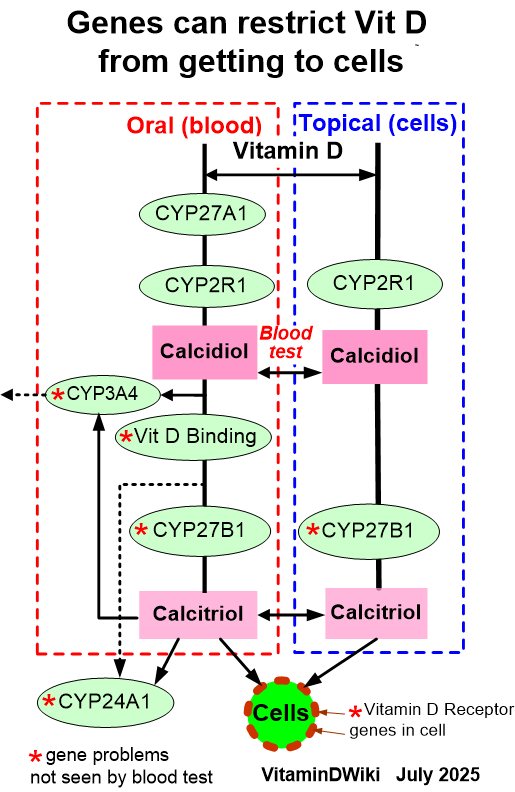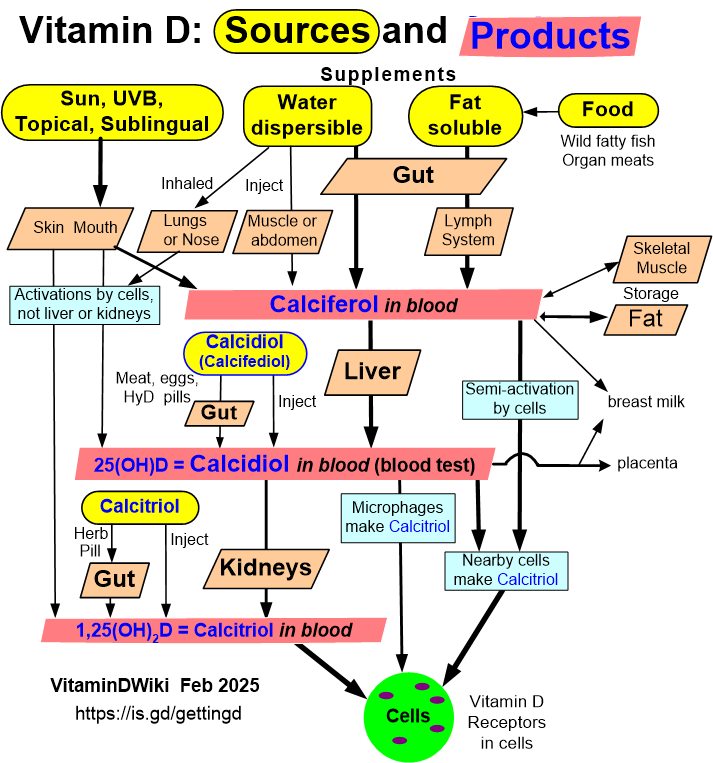Calcidiol
Overview
items in Calcidiol category
Calcidiol = Calcifediol = 25-hydroxyvitamin D3 = 25(OH)D = semi-activated Vitamin D
See also
Calcifediol (Calcidiol, semiactivated Vitamin D) - many studies 60 as of April, 2025
Tests for Vitamin D items
Calcitriol items
Injection items
Forms of Vitamin D items
Response to Vitamin D - many studies 186 as of June 2024
Calcidiol is now available on Amazon
- (~7X more expensive than standard Vitamin D)
Nanoemulsion Vitamin D is faster and better - many studies
- Response to Nanoemulstion Vitamin D swished in the mouth appears to start in 2 hours
Calcidiol - daily dose has fast response, but weekly might be better - March 2018

click on image for details
Chart from Getting Vitamin D into your blood and cells

Calcidiol articles
{category}
Calcidiol is now available on Amazon (had been prescription only)
@ 30 cents per capsule
Each capsule contains 2400 IU of Calcidriol which is about 4X more potent than Vitamin D
so a 30 cent capsule contains about 10,000 IU equivalent of Vitamin D
But, a 10,000 IU capsule of vitamin D costs about 4 cents
so Calcidriol is about 7X more expensive than standard Vitamin D
Calcidiol - daily dose has fast response, but weekly might be better - March 2018
Correction of vitamin D status by calcidiol: pharmacokinetic profile, safety, and biochemical effects on bone and mineral metabolism of daily and weekly dosage regimens.
Osteoporos Int. 2017 Nov;28(11):3239-3249. doi: 10.1007/s00198-017-4180-3
Minisola S1, Cianferotti L2, Biondi P1, Cipriani C1, Fossi C2, Franceschelli F2, Giusti F2, Leoncini G2, Pepe J1, Bischoff-Ferrari HA3, Brandi ML4.
📄 Download the PDF from Vitamin D Life
Daily high dose raised blood levels quickly

FGF23 - similar large daily dose and weekly dose

1,25 similar response to all treatments

Least Calcium lost in Urine = weekly

RATIONALE: Calcidiol can be employed to correct vitamin D deficiency.
MAIN RESULTS: Calcidiol administered at daily and weekly regimens over a period of 3 months was able to successfully raise 25-hydroxyvitamin D levels without altering other markers related to bone and mineral metabolism.
SIGNIFICANCE: Calcidiol supplementation is effective and safe.
INTRODUCTION:
The correction of vitamin D status is necessary to maintain an optimal mineral and skeletal homeostasis. Despite cholecalciferol (vitamin D3) is the most commonly used drug for vitamin D supplementation, the more hydrophilic compound calcidiol (25-hydroxyvitamin D3) can be employed at daily, weekly, and monthly regimens to reach in the short term the target levels of serum 25-hydroxyvitamin D [25(OH)D]. In the administration of different doses of calcidiol pharmacokinetic study (ADDI-D study), the efficacy and safety of daily and weekly dosages of calcidiol were tested.
METHODS:
A total of 87 Caucasian, community-dwelling, postmenopausal women, aged 55 years or older, with vitamin D inadequacy (serum 25(OH)D levels <30 ng/ml, with mean 25(OH)D below 20 ng/ml, namely 16.5 ± 7.5 ng/ml) were randomized to receive three different dosages of calcidiol: 20 μg/day, 40 μg/day, and 125 μg/week for 3 months. The attained level of serum 25(OH)D was selected as primary endpoint to assess efficacy, while other parameters of mineral metabolism, (serum calcium, parathyroid hormone, phosphate, FGF23, urinary calcium, and markers of bone turnover) were assessed as secondary endpoints to establish safety.
RESULTS:
In all the three groups, serum 25(OH)D values significantly and promptly rose and plateaued above the 30 ng/ml threshold remaining within safety interval after 14 days of treatment, with similar efficacy for the similar daily and weekly dose regimens. The different dosages were also equally effective in controlling secondary hyperparathyroidism. No significant changes in calcium and phosphate metabolism and in bone turnover markers were observed for any of the treatments, confirming the safety of this compound.
CONCLUSIONS:
The results of this study demonstrate the short- and mid-term efficacy and safety on core parameters of mineral metabolism of different daily or weekly dosages of calcidiol when used to treat vitamin D inadequacy or deficiency in postmenopausal women. Further studies are needed to assess falls as primary outcome of calcidiol supplementation.
